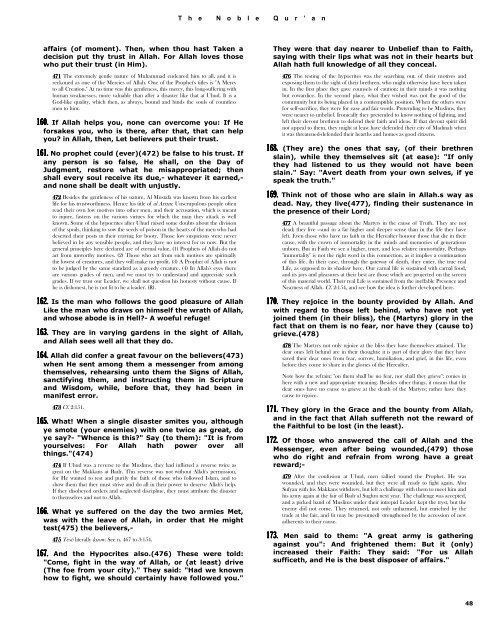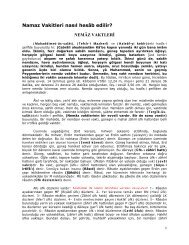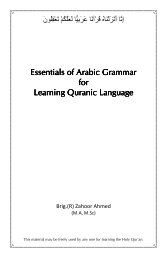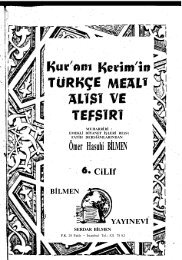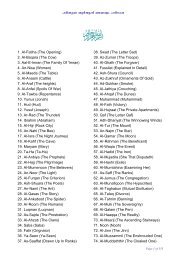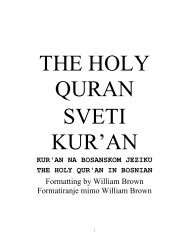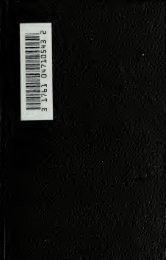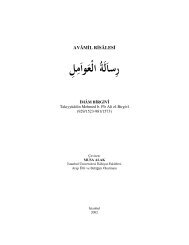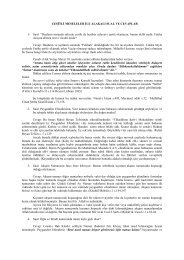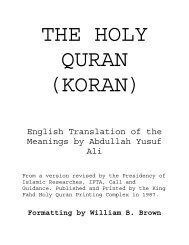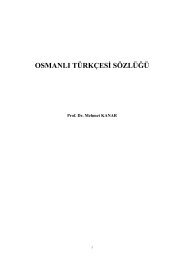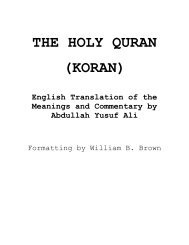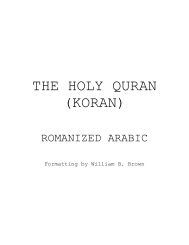English Quran with Commentaries By Yusuf-ali - HolyBooks.com
English Quran with Commentaries By Yusuf-ali - HolyBooks.com
English Quran with Commentaries By Yusuf-ali - HolyBooks.com
- No tags were found...
You also want an ePaper? Increase the reach of your titles
YUMPU automatically turns print PDFs into web optimized ePapers that Google loves.
T h e N o b l e Q u r ’ a n<br />
affairs (of moment). Then, when thou hast Taken a<br />
decision put thy trust in Allah. For Allah loves those<br />
who put their trust (in Him).<br />
471 The extremely gentle nature of Muhammad endeared him to all, and it is<br />
reckoned as one of the Mercies of Allah. One of the Prophet's titles is "A Mercy<br />
to all Creation." At no time was this gentleness, this mercy, this long-suffering <strong>with</strong><br />
human weaknesses, more valuable than after a disaster like that at Uhud. It is a<br />
God-like qu<strong>ali</strong>ty, which then, as always, bound and binds the souls of countless<br />
men to him.<br />
160. If Allah helps you, none can over<strong>com</strong>e you: If He<br />
forsakes you, who is there, after that, that can help<br />
you? in Allah, then, Let believers put their trust.<br />
161. No prophet could (ever)(472) be false to his trust. If<br />
any person is so false, He shall, on the Day of<br />
Judgment, restore what he misappropriated; then<br />
shall every soul receive its due,- whatever it earned,-<br />
and none shall be dealt <strong>with</strong> unjustly.<br />
472 Besides the gentleness of his nature, Al Mustafa was known from his earliest<br />
life for his trustworthiness. Hence his title of al Arrnn. Unscrupulous people often<br />
read their own low motives into other men, and their accusation, which is meant<br />
to injure, fastens on the various virtues for which the man they attack is well<br />
known. Some of the hypocrites after Uhud raised some doubts about the division<br />
of the spoils, thinking to sow the seeds of poison in the hearts of the men who had<br />
deserted their posts in their craving for booty. Those low suspicions were never<br />
believed in by any sensible people, and they have no interest for us now. But the<br />
general principles here declared are of eternal value, (1) Prophets of Allah do not<br />
act from unworthy motives. (2) Those who act from such motives are spiritually<br />
the lowest of creatures, and they will make no profit. (3) A Prophet of Allah is not<br />
to be judged by the same standard as a greedy creature. (4) In Allah's eyes there<br />
are various grades of men, and we must try to understand and appreciate such<br />
grades. If we trust our Leader, we shall not question his honesty <strong>with</strong>out cause. If<br />
he is dishonest, he is not fit to be a leader. (R).<br />
162. Is the man who follows the good pleasure of Allah<br />
Like the man who draws on himself the wrath of Allah,<br />
and whose abode is in Hell?- A woeful refuge!<br />
163. They are in varying gardens in the sight of Allah,<br />
and Allah sees well all that they do.<br />
164. Allah did confer a great favour on the believers(473)<br />
when He sent among them a messenger from among<br />
themselves, rehearsing unto them the Signs of Allah,<br />
sanctifying them, and instructing them in Scripture<br />
and Wisdom, while, before that, they had been in<br />
manifest error.<br />
473 Cf. 2:151.<br />
165. What! When a single disaster smites you, although<br />
ye smote (your enemies) <strong>with</strong> one twice as great, do<br />
ye say?- "Whence is this?" Say (to them): "It is from<br />
yourselves: For Allah hath power over all<br />
things."(474)<br />
474 If Uhud was a reverse to the Muslims, they had inflicted a reverse twice as<br />
great on the Makkans at Badr. This reverse was not <strong>with</strong>out Allah's permission,<br />
for He wanted to test and purify the faith of those who followed Islam, and to<br />
show them that they must strive and do all in their power to deserve Allah's help.<br />
If they disobeyed orders and neglected discipline, they must attribute the disaster<br />
to themselves and not to Allah.<br />
166. What ye suffered on the day the two armies Met,<br />
was <strong>with</strong> the leave of Allah, in order that He might<br />
test(475) the believers,-<br />
475 Test: literally know. See n. 467 to 3:154.<br />
167. And the Hypocrites also.(476) These were told:<br />
"Come, fight in the way of Allah, or (at least) drive<br />
(The foe from your city)." They said: "Had we known<br />
how to fight, we should certainly have followed you."<br />
They were that day nearer to Unbelief than to Faith,<br />
saying <strong>with</strong> their lips what was not in their hearts but<br />
Allah hath full knowledge of all they conceal.<br />
476 The testing of the hypocrites was the searching out. of their motives and<br />
exposing them to the sight of their brethren, who might otherwise have been taken<br />
in. In the first place they gave counsels of caution: in their minds it was nothing<br />
but cowardice. In the second place, what they wished was not the good of the<br />
<strong>com</strong>munity but its being placed in a contemptible position. When the others were<br />
for self-sacrifice, they were for ease and fair words. Pretending to be Muslims, they<br />
were nearer to unbelief. Ironically they pretended to know nothing of fighting, and<br />
left their devout brethren to defend their faith and ideas. If that devout spirit did<br />
not appeal to them, they might at least have defended their city of Madinah when<br />
it was threatened-defended their hearths and homes as good citizens.<br />
168. (They are) the ones that say, (of their brethren<br />
slain), while they themselves sit (at ease): "If only<br />
they had listened to us they would not have been<br />
slain." Say: "Avert death from your own selves, if ye<br />
speak the truth."<br />
169. Think not of those who are slain in Allah.s way as<br />
dead. Nay, they live(477), finding their sustenance in<br />
the presence of their Lord;<br />
477 A beautiful passage about the Martyrs in the cause of Truth. They are not<br />
dead; they live —and in a far higher and deeper sense than in the fife they have<br />
left. Even those who have no faith in the Hereafter honour those that die in their<br />
cause, <strong>with</strong> the crown of immort<strong>ali</strong>ty in the minds and memories of generations<br />
unborn. But in Faith we see a higher, truer, and less relative immort<strong>ali</strong>ty. Perhaps<br />
"immort<strong>ali</strong>ty" is not the right word in this connection, as it implies a continuation<br />
of this life. In their case, through the gateway of death, they enter, the true real<br />
Life, as opposed to its shadow here. Our carnal life is sustained <strong>with</strong> carnal food,<br />
and its joys and pleasures at their best are those which are projected on the screen<br />
of this material world. Their real Life is sustained from the ineffable Presence and<br />
Nearness of Allah. Cf. 2:154, and see how the idea is further developed here.<br />
170. They rejoice in the bounty provided by Allah. And<br />
<strong>with</strong> regard to those left behind, who have not yet<br />
joined them (in their bliss), the (Martyrs) glory in the<br />
fact that on them is no fear, nor have they (cause to)<br />
grieve.(478)<br />
478 The Martyrs not only rejoice at the bliss they have themselves attained. The<br />
dear ones left behind are in their thoughts: it is part of their glory that they have<br />
saved their dear ones from fear, sorrow, humiliation, and grief, in this life, even<br />
before they <strong>com</strong>e to share in the glories of the Hereafter.<br />
Note how the refrain: "on them shall be no fear, nor shall they grieve": conies in<br />
here <strong>with</strong> a new and appropriate meaning. Besides other things, it means that the<br />
dear ones have no cause to grieve at the death of the Martyrs; rather have they<br />
cause to rejoice.<br />
171. They glory in the Grace and the bounty from Allah,<br />
and in the fact that Allah suffereth not the reward of<br />
the Faithful to be lost (in the least).<br />
172. Of those who answered the call of Allah and the<br />
Messenger, even after being wounded,(479) those<br />
who do right and refrain from wrong have a great<br />
reward;-<br />
479 After the confusion at Uhud, men rallied round the Prophet. He was<br />
wounded, and they were wounded, but they were all ready to fight again. Abu<br />
Sufyan <strong>with</strong> his Makkans <strong>with</strong>drew, but left a challenge <strong>with</strong> them to meet him and<br />
his army again at the fair of Badr al Sughra next year. The challenge was accepted,<br />
and a picked band of Muslims under their intrepid Leader kept the tryst, but the<br />
enemy did not <strong>com</strong>e. They returned, not only unharmed, but enriched by the<br />
trade at the fair, and (it may be presumed) strengthened by the accession of new<br />
adherents to their cause.<br />
173. Men said to them: "A great army is gathering<br />
against you": And frightened them: But it (only)<br />
increased their Faith: They said: "For us Allah<br />
sufficeth, and He is the best disposer of affairs."<br />
48


